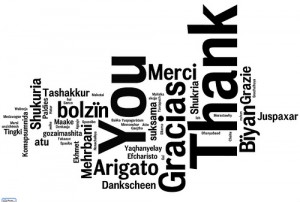What are you grateful for?
Start with the biggies: your kids, your marriage (maybe your divorce), life, a good job (or maybe
just a job), family, friends, that kind of stuff. Then work on the Hallmark things: babies, puppies, daisies, sunsets, and babies playing with puppies among the daisies at sunset.
But what about your shoes? Are you grateful for your shoes?
Before you answer this question, take a close look at your shoes. You may have more than one pair, so pick the pair you wear the most. If they are in your closet, go and examine them. If they are on your feet, take them off, and let’s have a look.
Start with the soles. Are they worn down or have you had your shoes resoled recently? What about the backs of the shoes: are they crushed from cramming your feet into the shoe by forcing the backs down to make room for the ball of your foot? When you take your shoes off, do you untie them or just crush the backs with the ball of the opposite foot and kick them off? Even if they are loafers, do you take them off or scrape them off? And when you do take them off, where do you put your shoes? Do you toss them in a closet where they can bet stepped on as you rummage for other things, or do you fill them out with a shoetree? How shiny are your shoes? When was the last time you polished them? Are your shoelaces in good condition or are they frayed and about to wear through?
Keep the answers in mind as you walk about outside barefoot. Go ahead: walk about a block without your shoes on to protect your feet. Some people live in areas where walking barefoot is hazardous. Even those who don’t, usually find walking without shoes painful when rocks, sticks, and debris tear into their feet.
So let me ask you again: are you grateful for your shoes?
Of course you are. They protect your feet, and your feet need protecting. And even if your feet need no protection there are some restaurants you love visiting that won’t let you in without shoes, so, if for no other reason, you may feel grateful to your shoes because they get you into those restaurants to eat. But feeling grateful isn’t enough. Do you show gratitude to your shoes? Does your feeling grateful translate into being grateful and does your being grateful translate into your doing grateful?
The answer is in your shoes. Broken back shoes, scuffed shoes, worn down shoes, shoes that show signs of neglect and abuse answer the question about gratitude far more powerfully than any words you might utter or emotions you might feel. Gratitude is more than something you feel, it is something you do. Gratitude is a verb.
I own five pairs of shoes. I have a pair of running shoes, a pair of loafers, a pair of dress shoes, and two pairs of Crocs, one for wearing in the house and one for wearing outside. My dress shoes are made by Rockport. They look like wingtips on the outside and feel like running shoes on the inside.
These particular shoes have to be sent to the manufac- turer to be resoled. The first time I did this, the shoes were returned to me in near mint condition accompanied by
a hand written letter signed by the person who did the repair. I assumed this was a preprinted form letter, but that assumption proved false as I read the brief note:
Dear Rabbi Shapiro,
We at Rockport take great pride in the quality of our work and our product. It is clear to me from the condi- tion of your shoes, however, that you do not. The backs are cracked from improper use; the leather is dry from insufficient cleaning and polishing; and the over all look of the shoe is sloppy. On behalf of all of us who work hard to offer you a quality product, I wish you would take better care of our shoes.
In the box along with the shoes and the note was a shoe cleaning kit complete with polish and a brush.
These people were serious about their work, and wanted me to treat their shoes as if they were my own. Wait a minute: they are my own! These are the shoes that protect my feet from all kinds of dangers: hot sidewalks, jagged rocks, broken glass, discarded hypodermic needles, human vomit, duck droppings, and dog poop—I walk in some pretty rough places—so why don’t I live the gratitude I say I feel toward my shoes? Because I treat them as an It, an object to be exploited, rather than a Thou, a presence to be honored.
As it turned out, what was true about my shoes was true about my toothbrush, the plumbing in my home, and even the plumbing in my body. In fact it turned out to be true about most of the things in my life, and perhaps the people as well.
Most of you are probably aware of this and do your best to cultivate I–Thou connections rather than I–It ones. But let me share a practice with you that you may not know. It is a Jewish practice called Asher Yatzar, “Who forms humanity.” Whenever you go to the bathroom and move your bowels or empty your bladder, recite this prayer.
I have it printed out and framed where I can see it while I’m sitting on the toilet. Here is my rendition of the Hebrew. You can find a more literal version on line.
Blessed are You, Yah, Source and Substance of all creation, Who gives rise to me as an ocean gives rise to waves. My body is a marvel of openings and closings, fills and hollows. If that which should close, not close; or that which should open, not open, I could not survive. Yet over these I have no control. I owe my very being to their proper functioning, and I am made humble and grateful with this knowing. Blessed are You, Yah, Who opens and closes, rises and falls, all in the wondrous dance of being and becoming.
The seeds of gratitude are found in the strangest places, aren’t they?
Rabbi Rami Shapiro, PhD, an award winning poet and essayist, has written over a dozen works of translation, biblical commentary, and nonfiction. He is also author of the column, Roadside Assistance for Your Spiritual Journey, in Spirituality & Health magazine. He can be reached through his website www.rabbirami.com













